Abbott Announces Plan To Reopen Bars In Some Counties
As more reopening plans are announced, more students return to classrooms, and local health officials monitor a recent uptick in COVID-19 numbers, here’s what you need to know today:
- Abbott announces plan to reopen bars in some counties;
- Jenkins: County COVID-19 numbers continue ‘upward trajectory’;
- Abbott encourages health care providers to enroll in DSHS immunization program in preparation for COVID-19 vaccine.
Abbott Announces Plan To Reopen Bars In Some Counties
Gov. Greg Abbott Wednesday announced, as he’d previously hinted on social media, that bars would be able to reopen for the first time since June at 50% capacity beginning Oct. 14 in conjunction with county officials.
“Only two types of businesses have not been open since July–one is river tubing operations and the other is bars. It is time to open them up,” Abbott said.
He said they would have to follow safety protocols including requiring patrons be seated while eating or drinking (with limited exceptions for sampling at breweries, distilleries, and wineries), and requiring masks when they are not seated at a table. Additionally, tables must be limited to six individuals or less and all establishments must follow specific curfew guidelines.
Dallas County Judge Clay Jenkins tweeted that he wouldn’t file to reopen bars in Dallas County.
Regarding opening bars in Dallas County: I will not file to open them at this time. Below is the current guidance from the Public Health Committee and @DCHHS. We are in orange but our numbers are increasing (BadI) I will listen to everyone but will follow the science. pic.twitter.com/wvak33TnZw
— Clay Jenkins (@JudgeClayJ) October 7, 2020
“We are in orange but our numbers are increasing,” Jenkins tweeted. “I will listen to everyone but will follow the science.”
Abbott said that Texans being more informed about how quickly the virus can spread, increased testing, and improved safety protocols should allow this reopening to be more successful than the first attempt to reopen bars earlier this summer was. Abbott first announced bars could reopen at a limited capacity in May, but closed them again in June amid rising COVID-19 cases.
Additionally, beginning Oct. 14, Abbott announced , all counties where COVID-19 hospitalizations are less than 15% of hospital capacity can open all businesses other than bars to 75% capacity.
Abbott noted that the additional reopenings “does not mean that COVID is no longer a threat.”
“Most Texans are still susceptible to it,” he said. “Everyone has the individual ability to avoid getting COVID and to avoid spreading COVID simply by following the safe practices that everyone has already learned.”
Jenkins: County COVID-19 Numbers Continue ‘Upward Trajectory’
Dallas County Health and Human Services Wednesday reported 343 additional COVID-19 cases, and two more deaths.
There were also six additional probable cases reported Wednesday. Of the 337 new confirmed cases reported Wednesday, 232 came through the Texas Department of State Health Services’ (DSHS) electronic laboratory reporting (ELR) system, and four are considered old cases.
The additional deaths reported Wednesday include a Dallas man in his 60s who died in a hospital emergency room, and a Richardson man in his 80s. Both had underlying health conditions.
Of the 1,040 confirmed deaths reported to date, about 25% have been associated with long-term care facilities.
A provisional total of 252 confirmed and probable COVID-19 cases were diagnosed in school-aged children between 5 and 17 years during the week ending Sept. 26. The percentage of cases occurring in young adults aged 18 to 22 years was 12% for the month of September.
Highland Park ISD reported one case in the week ending Sept. 5, seven cases the week ending Sept. 12, and 23 cases the week ending Sept. 19, according to Dallas County Health and Human Services’ Oct. 6 summary report.
Dallas ISD reported 55 cases the week ending Sept. 5, 48 the week ending Sept. 12, and 91 the week ending Sept. 19.
There were 12 cases reported among private schools in Dallas County the week ending Sept. 5, 19 cases reported the week ending Sept. 12, and one case the week ending Sept. 19.
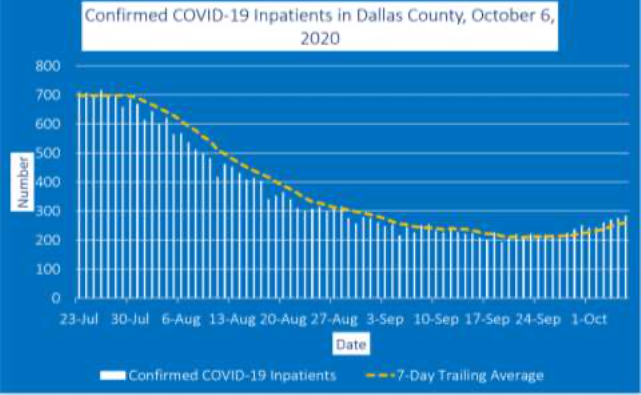
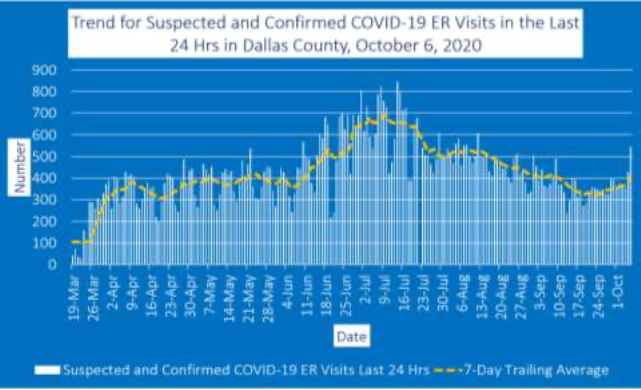
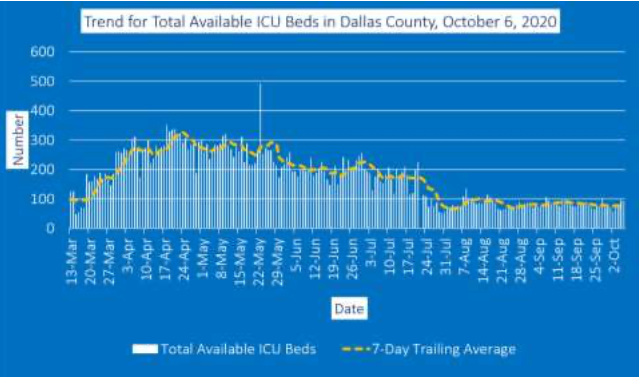
Of all confirmed cases requiring hospitalization to date, more than two-thirds have been under 65 years of age.
Dallas County reported 284 COVID-19 patients in hospitals Tuesday. The number of emergency room visits for COVID-19 like symptoms in Dallas County was 544 for the 24 hour period ending on Tuesday, which represents around 20% of all emergency department visits in the county according to information reported to the North Central Texas Trauma Regional Advisory Council.
“Today’s numbers continue an upward trajectory that we are seeing in both new COVID-19 cases and hospitalizations, ED visits and the number of patients on ventilators. This, while the number of people getting tested at our free COVID-19 test sites remains low. Please don’t wait until you or a loved one becomes infected or your business sustains an outbreak before you take the advice of local medical experts and the CDC to wear a mask when around others outside your home, maintain six-foot distance and avoid unnecessary crowds,” said Jenkins Wednesday. “We are seeing increased cases coming not only from businesses as the Governor has increased occupancy limits but also from home and backyard get-togethers. It’s understandable that the public would falsely believe that the numbers are going down when the Governor is reopening businesses and therefore people have loosened their guard for their home gatherings, but this would be a mistake according to DFW health experts because the fact is the numbers are going up. We must remain vigilant to the simple safeguards that will keep our community safe. There is increasing evidence that masking protects the wearer and those around them so please wear your mask and resist the urge to attend or have large gatherings of any type.”
The percentage of respiratory specimens testing positive for the virus that causes COVID-19 remains high, the county says, with 10.7% of symptomatic patients presenting to area hospitals testing positive in the week ending Sept. 26.
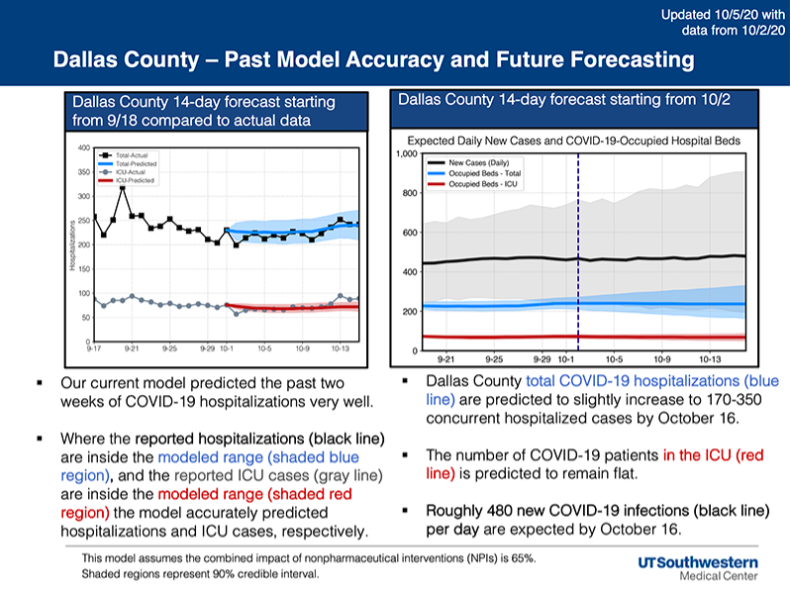
UT Southwestern Medical Center’s model projects Dallas County total COVID-19 hospitalizations could slightly increase to between 170 and 350 concurrent hospitalized cases by Oct. 16, and roughly 480 new COVID-19 infections per day are expected by Oct. 16.
Abbott Encourages Health Care Providers To Enroll In DSHS Immunization Program In Preparation For COVID-19 Vaccine
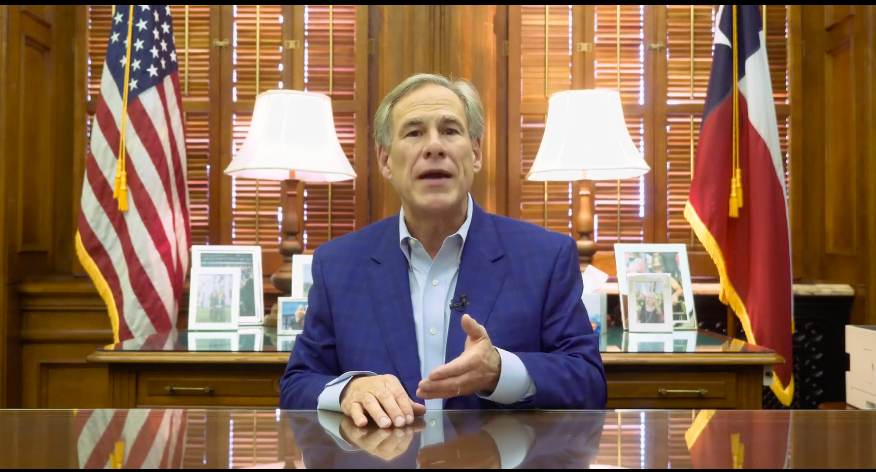
Abbott Wednesday encouraged Texas health care providers to enroll in the Texas Department of State Health Services’ (DSHS) Immunization Program to be eligible to administer COVID-19 vaccines once they are available. Hospitals, medical practices, pharmacies, and long-term care facilities that want to participate are required to enroll as vaccine providers at EnrollTexasIZ.dshs.texas.gov to administer COVID-19 immunizations in Texas.
“While potential COVID-19 vaccines continue to undergo clinical trials, the State of Texas is taking a proactive approach to ensure the vaccine is distributed as quickly as possible once available,” said Abbott. “Providing Texans with access to a voluntary vaccine and efficiently administering the immunization will be essential to containing COVID-19 and protecting the health of our communities. I urge health care providers across the state to sign up for DSHS’ Immunization Program so they are prepared to administer the COVID-vaccine to Texans who choose to be immunized.”
While vaccine production ramps up, the supply will be limited and provided to critical populations such as health care workers or people at a higher risk of severe disease. As more doses become available, more of the enrolled providers will begin to receive vaccine for the people they serve.
Doses of the voluntary COVID-19 vaccine and the supplies needed to administer the immunization will be provided by the Centers for Disease Control and Prevention and shipped directly to providers after they are allocated by DSHS.
Under federal guidelines, providers who choose to participate must agree to administer vaccine regardless of a recipient’s ability to pay, provide a vaccination record to each recipient, store doses of vaccine under the proper conditions, and report the number of doses received and used. Any vaccine must be authorized by the Food and Drug Administration before it can be distributed in the United States. DSHS will host opportunities for public comment and provide more information about vaccine distribution as it becomes available. For more information on the DSHS Immunization Program, visit EnrollTexasIZ.dshs.texas.gov.





